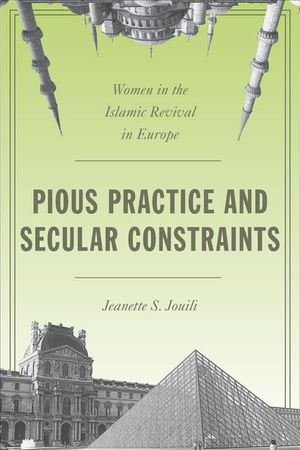Pious Practice and Secular Constraints
Published by Stanford University Press
This chronicle of observant Muslim women’s daily challenges in secular settings is “a welcome contribution [that] can be useful in many disciplines” (Journal of Church and State).
The visible increase in religious practice among young European-born Muslims has provoked public anxiety. Now, government regulations seek not only to restrict Islamic practices within the public sphere, but also to shape Muslims’—and especially women’s—personal conduct. Pious Practice and Secular Constraints chronicles the everyday ethical struggles of women active in orthodox and socially conservative Islamic revival circles as they are torn between their quest for a pious lifestyle and their aspirations to counter negative representations of Muslims within the mainstream society.
Jeanette S. Jouili conducted fieldwork in France and Germany to investigate how pious Muslim women grapple with religious expression: for example, when to wear a headscarf, where to pray throughout the day, and how to maintain modest interactions between men and women. Her analysis stresses the various ethical dilemmas the women confronted in negotiating these religious duties within a secular public sphere. In conversation with Islamic and Western thinkers, Jouili teases out the important ethical-political implications of these struggles, ultimately arguing that Muslim moral agency, surprisingly reinvigorated rather than hampered by the increasingly hostile climate in Europe, encourages us to think about the contribution of non-secular civic virtues for shaping a pluralist society.
“Jeanette Jouili’s book will be of great interest to scholars working on theories of modernity, orthodoxy, citizenship, gender, space, and ethics. It will be a superlative teaching aid for classes in anthropology, sociology, women's and gender studies, urban studies, philosophy, comparative religion, and more.” —American Ethnologist
The visible increase in religious practice among young European-born Muslims has provoked public anxiety. Now, government regulations seek not only to restrict Islamic practices within the public sphere, but also to shape Muslims’—and especially women’s—personal conduct. Pious Practice and Secular Constraints chronicles the everyday ethical struggles of women active in orthodox and socially conservative Islamic revival circles as they are torn between their quest for a pious lifestyle and their aspirations to counter negative representations of Muslims within the mainstream society.
Jeanette S. Jouili conducted fieldwork in France and Germany to investigate how pious Muslim women grapple with religious expression: for example, when to wear a headscarf, where to pray throughout the day, and how to maintain modest interactions between men and women. Her analysis stresses the various ethical dilemmas the women confronted in negotiating these religious duties within a secular public sphere. In conversation with Islamic and Western thinkers, Jouili teases out the important ethical-political implications of these struggles, ultimately arguing that Muslim moral agency, surprisingly reinvigorated rather than hampered by the increasingly hostile climate in Europe, encourages us to think about the contribution of non-secular civic virtues for shaping a pluralist society.
“Jeanette Jouili’s book will be of great interest to scholars working on theories of modernity, orthodoxy, citizenship, gender, space, and ethics. It will be a superlative teaching aid for classes in anthropology, sociology, women's and gender studies, urban studies, philosophy, comparative religion, and more.” —American Ethnologist
BUY NOW FROM
COMMUNITY REVIEWS
